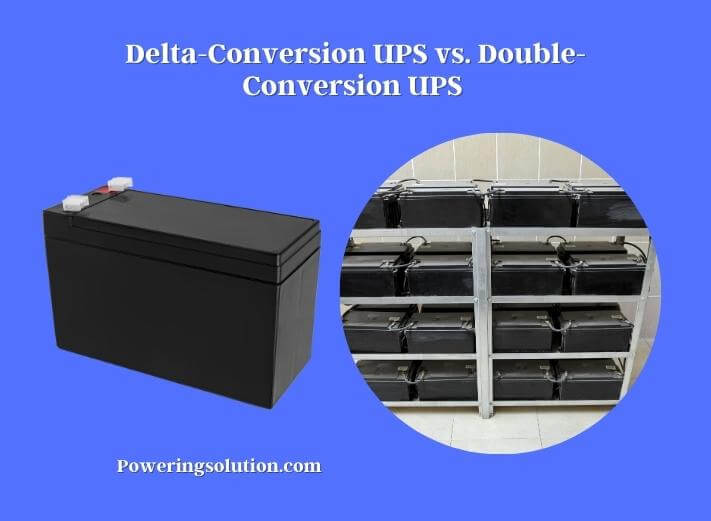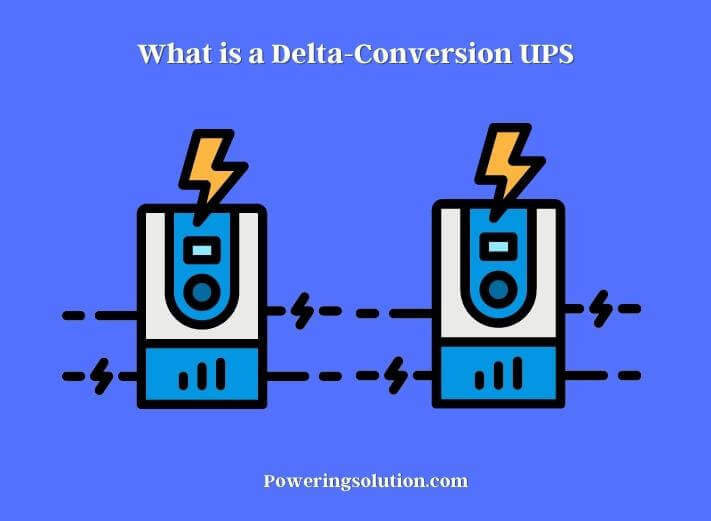When it comes to protecting your electronic devices from power outages, an Uninterruptible Power Supply (UPS) is an essential device to have. UPS systems provide a backup power source that can keep your devices running even when the main power source is unavailable. There are various types of UPS systems available in the market, but the two most common types are Delta-Conversion UPS and Double-Conversion UPS.

Delta-Conversion UPS and Double-Conversion UPS systems both provide reliable power protection, but they function differently and offer different benefits. Delta-Conversion UPS systems are more efficient, less expensive, and smaller in size, making them ideal for non-critical applications. Double-Conversion UPS systems provide constant voltage regulation, and better surge protection, and are better suited for critical applications where downtime can be costly. Understanding the differences between these two types of UPS systems can help you choose the best one for your needs.
You have to know that a propane generator is a type of generator that uses propane gas to power its engine. Read the article for more information.
What is a Delta-Conversion UPS?
A Delta-Conversion UPS is a type of UPS system that converts AC power to DC power and then back to AC power. It works by isolating the AC power source from the DC power source using a delta transformer. The DC power source is then converted back to AC power, which is used to power your electronic devices.
Advantages of Delta-Conversion UPS
- High efficiency;
- Lower cost;
- Smaller size;
- Ideal for non-critical applications;

Disadvantages of Delta-Conversion UPS
- Not suitable for critical applications
- Limited surge protection
What is a Double-Conversion UPS?
A Double-Conversion UPS is a type of UPS system that converts AC power to DC power and then back to AC power continuously. It works by isolating the AC power source from the DC power source using a double-conversion process. The DC power source is then converted back to AC power, which is used to power your electronic devices.
Advantages of Double-Conversion UPS
- High surge protection
- Ideal for critical applications
- Provides constant voltage regulation
- No switching time
Disadvantages of Double-Conversion UPS
- Low efficiency
- High cost
- Large size
Delta-Conversion UPS vs. Double-Conversion UPS
Now that we have an understanding of both types of UPS systems, let’s compare and contrast them.
Efficiency
Delta-Conversion UPS systems are more efficient than Double-Conversion UPS systems. Delta-Conversion UPS systems are capable of achieving up to 98% efficiency, whereas Double-Conversion UPS systems are only capable of achieving up to 92% efficiency.
Cost
Delta-Conversion UPS systems are less expensive than Double-Conversion UPS systems. This is because Delta-Conversion UPS systems do not require as many components as Double-Conversion UPS systems.
Size
Delta-Conversion UPS systems are smaller in size than Double-Conversion UPS systems. This is because Delta-Conversion UPS systems do not require as many components as Double-Conversion UPS systems.
Surge Protection
Double-Conversion UPS systems provide better surge protection than Delta-Conversion UPS systems. This is because Double-Conversion UPS systems constantly convert power from AC to DC and then back to AC, providing better protection against power surges.
Voltage Regulation
Double-Conversion UPS systems provide constant voltage regulation, whereas Delta-Conversion UPS systems do not. This is because Double-Conversion UPS systems constantly convert power from AC to DC and then back to AC, providing a constant voltage output.
Switching Time
Double-Conversion UPS systems have no switching time, whereas Delta-Conversion UPS systems have a switching time of up to 10 milliseconds. This means that Double-Conversion UPS systems are better for critical applications where even a small amount of downtime can cause significant problems.
Real-World Applications of Delta-Conversion and Double-Conversion UPS
Delta-Conversion and Double-Conversion UPS systems have several real-world applications. Here are some examples:
- Data centers require reliable power protection to ensure that servers and other equipment don’t experience downtime. Double-Conversion UPS systems are typically used in data centers because they provide constant voltage regulation and surge protection.
- Hospitals require uninterrupted power to operate critical equipment such as life-support systems and monitoring devices. Double-Conversion UPS systems are often used in hospitals because they provide fast switchover time to battery power in the event of a power outage.
- Telecommunications equipment requires stable power to operate correctly. Delta-Conversion UPS systems are commonly used in telecommunications applications because they are efficient and provide reliable power protection.
- Industrial control systems require stable power to operate machinery and equipment. Delta-Conversion UPS systems are often used in industrial control applications because they are efficient and provide reliable power protection.
- Office buildings require power protection to ensure that computers and other equipment are not damaged by power surges or outages. Delta-Conversion UPS systems are often used in office buildings because they are less expensive and more compact than Double-Conversion UPS systems.
What are the benefits of using online UPS systems for securing power supply compared to other UPS systems like Delta-Conversion and Double-Conversion UPS?
Online UPS systems provide superior power protection compared to Delta-Conversion and Double-Conversion UPS systems due to “how they work“. By continuously supplying power from the battery, online UPS systems offer seamless protection against power disruptions, ensuring uninterrupted operation for sensitive equipment and critical systems.
Installation and Maintenance Considerations for Delta-Conversion and Double-Conversion UPS
Proper installation and maintenance are critical to ensuring the reliable operation of Delta-Conversion and Double-Conversion UPS systems. Here are some important installation and maintenance considerations to keep in mind:
Installation
Proper Location
UPS systems should be installed in a cool, dry location with adequate ventilation to prevent overheating.
Electrical Wiring
Electrical wiring must be installed correctly to ensure that the UPS system is properly grounded and that there are no voltage drops or power surges.
Battery Installation
Batteries must be installed correctly to ensure that they are properly charged and can provide backup power when needed.
Load Management
Proper load management is critical to prevent overloading the UPS system and causing it to fail.
Maintenance
Regular Inspections
UPS systems should be inspected regularly to ensure that they are functioning correctly and that all components are in good condition.
Battery Replacement
Batteries should be replaced periodically to ensure that they are functioning correctly and can provide backup power when needed.
Cleaning
UPS systems should be kept clean to prevent dust and debris from accumulating and causing damage to the system.
Firmware Updates
Firmware updates should be performed periodically to ensure that the UPS system is up-to-date and can provide optimal performance.
If you follow these installation and maintenance considerations, you can ensure that your Delta-Conversion or Double-Conversion UPS system is operating reliably and providing the necessary power protection for your critical equipment.
Final Thoughts
Both Delta-Conversion and Double-Conversion UPS systems offer reliable power protection for your critical equipment. Choosing the right UPS system depends on your specific needs and requirements. While Delta-Conversion UPS systems are generally less expensive and more efficient, Double-Conversion UPS systems provide instant switchover to battery power in the event of a power outage and may be more suitable for higher power applications.
It’s important to consider factors such as cost, power requirements, downtime tolerance, efficiency, environmental considerations, and maintenance requirements when choosing between these two UPS systems. Proper installation and maintenance are also critical to ensure the reliable operation of your UPS system.
Investing in the right UPS system for your needs is essential to protect your equipment and prevent costly downtime. By understanding the differences between Delta-Conversion and Double-Conversion UPS systems and considering the factors mentioned above, you can make an informed decision and choose the best UPS system for your specific requirements.
